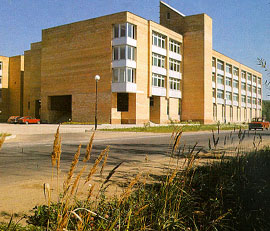
Welcome to the Dubna University Homepage
Dubna University opened on October 1, 1994. The founders of the University were the Administration of Moscow Region, the State on Higher Education, the Federal Ministry of Science and Technical, the Federal Employment Service, the Academy of Natural Sciences, the
Joint Institute for Nuclear Research
and the Administration of the City of Dubna (world famous for its international scientific center JINR).
The
city of Dubna offers everthing necessary for a University campus: buildings,
dormitories for Russian and foreign students, a hotel for tutors, recreational
and student centers (including a gym, a dining hall, and a stadium).
The
climate in Dubna is pleasant, the location is close to the Volga and Dubna
rivers, the Moscow man-made lake and surrounding forests. There is excellent
transportation to Moscow by train and by bus.
Dubna
University is an institution of higher education designed for educating
students in humanities, natural sciences and other professional specialities.
Its instructors use contemporary, world-renowned teaching methods. In order
to provide the students with the highest quality education possible, the
curriculum is student-centered. Upper-level students are offered a choice
of electives in order to meet their individua intellectual and professional
needs.
Though
the University was only recently founded, it has already established a
relationship with an American university, the University
of Wisconsin - La Crosse. This relationship has provided and continues
to provide a means by which to exchange ideas about teaching philosophies
and curriculum design. Ties with Universities of Germany, Denmark and Israel
have also been established.
The
idea of creating a university in Dubna was initiated by V.G.Kadyshevsky,
an internationally known physicist. Director of the JINR and Corresponding
Member of RAS, he is currently the president of Dubna University.
The
plan to establish a university in Dubna was further supported and promoted
b the Academy of Natural Sciences (ANS) and its President, Prof. O.L.Kuznetsov.
Oleg Kuznetsov is a distinguished scientist of Earth sciences as well as
computer programming. He has been appointed as Rector of Dubna University.
Through
the efforts and guidance of JINR Vice-Director, Professor A.N.Sisakian
(Academician of AES and ANS), a JINR Training Center has been established
at the University. Professor Sissakian is currenlty Vice-President.
The
city of Dubna mayor, V.E.Prokh,
and Head of the Educational Center of Dubna, K.G.Amirtaev, played crucial
roles in acquiring buildings and financial support for the new university.
V.E.Prokh and K.G.Amirtaev are now Vice-presidents. Mr. A.V.Dolgolaptev,
the Vice-Chairman of the Federation Council of Russia, supported the idea
of the University and helped to establish it.
Among
others who have actively contributed to the creation of Dubna University
are: S.P.lvanova, Director of the
JINR University Center; A.A.Rats
Vice-mayor of Dubna; Vice- Rectors of the University Yu.S.Sakharov, M.S.Khoziainov,
V.A.Tsapsin; E.N.Cheremisina Chief
of the University's Chair. Among the University tutors are: Academicians
of ANS A.M.Gorodnitsky, V.A.Zolotarev, K.P.Kavun, M.P.Kapustln, 0.G.Sorokhtin,
V.M.Shvalev, professors I.M.Gramenitsky, l.L.Khodakovsky, l.B.Shatunovsky,
and others.
In 1994,
the first 115 students were admitted to the University. They will pursue
Bachelor's degrees in the following areas: Economics, Ecology and Environment
Science; and Business. There are plans to expand the university's offerings
to include: Mathematics, Applied Mathematics and Computer Sciences, Linguistics,
Physics and Law. In addition to the established curriculum, students have
opportunities to hear lectures on current issues in science and social
problems. Outstanding Russian and foreign scientists and politicians are
invited to lecture at the University.
Students
at Dubna University must progress through three grades, which are to be
achieved successively.
All
undergraduates take General Education, which is uniquely concerned with
the broad education of the whole person. The primary purpose of General
Education is to cultivate knowledge, skills and dispositions essential
for advanced and independent learning. Thwe standard duration a student
sp ends in this program is two years.
The
second level implements the basic higher education program, which aims
to provide students with fundamental pre-professional knowledge in a chosen
area, thus creating a foundation for further training according to the
programs of the third level of higher education. The standard duration
of this program is 2 years. Those who successfully complete the basic higher
education are awarded the academician degree of Bachelor of Science.The
Third level includes a program of higher education and a programm of specialized
higher education.
A standard
duration for mastering the first program is no less than a year. The graduates
are awarded the qualification of a Certified Specialist. The standard duration
of mastering the second programm is no less than 2 years. Those who successfully
complete the programm are given the Master's Degree.
Got some questions?

